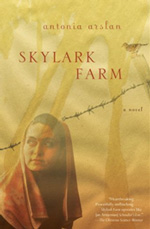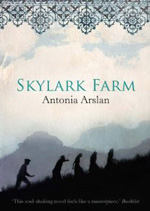


Vintage, paperback, 9781400095674
Atlantic Books, paperback, 9781843546733
In 1915, the Young Turks, fired by an overwhelming sense of nationalism, embarked on a mission to purge Turkey of its minority citizens. Between 1914 and 1918, over one million Armenian lives were lost at the hands of a maniacal regime. Antonia Arslan's debut novel, Skylark Farm, tells the heartbreaking tale of a family torn apart by hatred, war, and hopelessness as they march out of the beautiful and lush Anatolian hills they once called home and into the barren and unkind desert that promises death.
In their seemingly idyllic community, the family excitedly awaits the return of their westernized brother and uncle, Yerwant. A large family, wealthy and well respected, every day is a celebration for them; they believe that their vast education, allegiance to their country, and hard work will help them maintain their positions in society alongside their Turkish counterparts. Soon, however, their lives are turned upside down as the Turkish extremists' plans are set in motion, and Yerwant's path to his homeland is blocked by the start of the First World War. Almost all of the men and boys of the family are immediately killed, and the women are forced to march to Syria—starved, beaten, raped, and left to die one by one.
For a debut novel, Arslan has done quite well. Often gruesome but always riveting, her words blend the sumptuous language of contemporary Italian literature with the darkly beautiful and poetic lamentations and verses that conjure up Isaac Babel's Red Cavalry. Few writers are able to mention blood, gore, and violence and evoke more than disgust; during the course of this often disturbing narrative, Arslan unharnesses a number of different responses from a reader in addition to disgust, including empathy, anger, helplessness, and confusion. For example, the disgust one might feel in response to a depiction of castration is overshadowed by the horror one feels knowing that the castration is performed on a peaceful, well-liked man for sport. About the rape of Arussiag, a quiet teenaged girl described as "rather ugly", Arslan writes that "she gave little trouble to the soldier …. but apparently little pleasure, too. And so he brought her back, saying she just wasn't any good." These lines are infused with the perverse irony that her virtue has been taken from her, yet the soldier (and other soldiers, presumably) was not pleasured by the act of rape he expected to enjoy. The relief the reader feels at her return is bittersweet; Arussiag may be free from unwanted advances for the time being, but on the other hand, she has become a woman amidst blood, fear, and death.
Skylark Farm examines extremes of good and evil: how overwhelming hatred coupled with limitless determination
make a dangerous combination, and how people will push themselves to great lengths to survive and to save. It is
a moving tale of love, friendship, loyalty, redemption, personal sacrifice, and of all of those things that
make us human.
